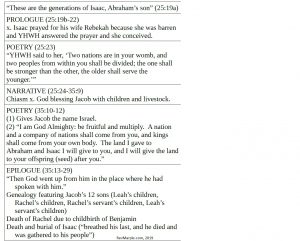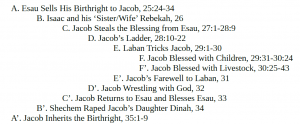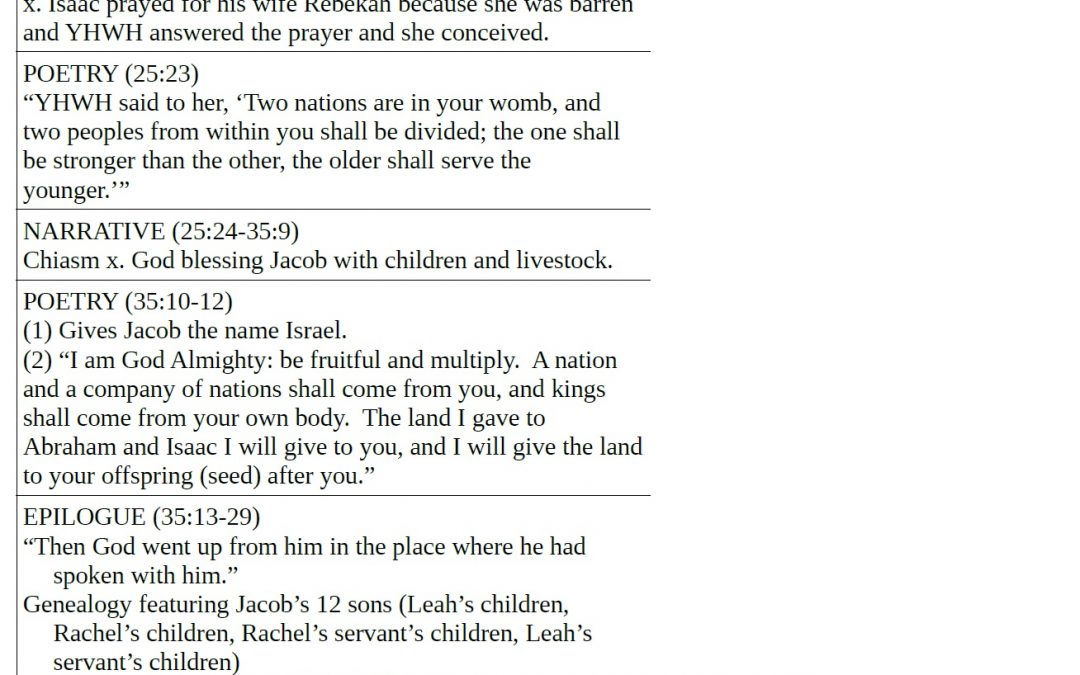
This book follows the same pattern as the first part of Book Six: prologue, poetry, narrative, poetry, and epilogue. The title is “These are the generations of Isaac, Abraham’s son” (Gen 25:19). This should mean that the book will be about Isaac’s descendants, and this is the focus of the book, but like Noah in Book Three the account of Isaac’s death is in the epilogue. Book Seven was so short in comparison partly because the author was in a hurry to get to Isaac. But, even so, Isaac is not portrayed very favorably and his life must be pieced together from Books Six and Eight as a result. Instead of Book Eight focusing on Isaac, it will focus on Jacob.
At the center of the prologue (Gen 25:19-22) we find that Isaac prayed for his wife Rebekah because she is barren and YHWH answered the prayer and she conceived (Gen 25:21). This should remind us of the center of the prologue in Book Six: “Now Sarai was barren; she had no child” (Gen 11:30). But this time the barren Rebekah conceives and has twins who are fighting in the womb. The rest of the book will be concerned with which of the twins, Esau or Jacob, will be the heir to the promise.
The epilogue (Gen 35:13-29) follows the same pattern of the two epilogues in Book Six except instead of they arose and went it is God who “went up from him in the place where he had spoken with him” (Gen 35:13). The epilogue also has a genealogy, this one featuring the number twelve as it tells us the twelve sons of Jacob. And it recounts the death and burial of Isaac. Like with Ishmael, the “he died and was gathered to his people” (Gen 35:29) language is used (see the commentary on Book Seven). The epilogue also recounts the death of Rachel as a result of the birth of Benjamin. And it mentions in passing that Reuben “went and lay with Bilhah his father’s concubine. And Israel heard of it” (Gen 35:22). This is all preparing us for Book Ten.
The first poetic section is in response to Rebekah’s prayer since the twins are fighting in her womb, “YHWH said to her, ‘Two nations are in your womb, and two peoples from within you shall be divided; the one shall be stronger than the other, the older shall serve the younger” (Gen 25:23). So the poetry right at the beginning indicates that the younger son will be the heir to the promise.
In the second poetic section God says two poems. In the first he gives Jacob (the younger son) the name Israel (Gen 35:10). In the second, He says to Jacob, “I am God Almighty: be fruitful and multiply. A nation and a company of nations shall come from you, and kings shall come from your own body. The land that I gave to Abraham and Isaac I will give to you, and I will give the land to your offspring (seed) after you” (Gen 35:11-12). This poem reminds us of the creation mandate “Be fruitful and multiply and fill the earth and subdue it and have dominion over…” (Gen 1:28). It was repeated to Noah and his sons “Be fruitful and multiply and fill the earth” (Gen 9:1, cf. 9:7). And more immediately, Isaac’s words to Jacob “God Almighty bless you and make you fruitful and multiply you, that you may become a company of peoples. May he give the blessing of Abraham to you and to your offspring with you, that you may take possession of the land of your sojournings that God gave to Abraham” (Gen 28:3-4). The language of nations/kings also brings to mind God’s words as he renamed Sarai as Sarah and Abram as Abraham (Gen 17:6 and 17:16). The creation mandate and the blessing have passed down to Jacob/Israel.
Both poems point us to Jesus Christ as the heir.
The Narrative (Gen 25:24-35:9) of Book Eight:

As usual, the longest portion is the narrative (Gen 25:24-35:9). The chiastic arrangement of prologue, poetry, narrative, epilogue sets us up to expect it (as in Book Six) to continue in the narrative. And this is what we find. The first story (Gen 25:24-34) tells us about the birth of Esau (explaining why he is also called Edom) and Jacob. The second born child Jacob was holding Esau’s heel when he came out. And the story tells us about Esau selling Jacob his birthright for some stew. The text tells us, “Thus Esau despised his birthright” (Gen 25:34). Jacob will inherit. In the last story (Gen 35:1-9) Jacob professes his faith in the true and living God, telling his household, “Put away the foreign gods that are among you and purify yourselves and change your garments. Then let us arise and go up to Bethel, so that I may make an altar to the God who answers me in the day of my distress and has been with me wherever I have gone” (Gen 35:2-3). And Jacob inherits the blessing.
The second story (Gen 26) is where Isaac pretends that his wife Rebekah is his sister. This follows the same pattern of the similar stories for Abram/Abraham and his sister/wife Sarai/Sarah (Gen 12:10-20 and 20:1-18). We also find out that Esau married two Hittite women who cause problems for his parents. In the parallel place, the second-to-last story (Gen 34) is not one of Jacob pretending one of his wives was his sister but instead Shechem raping Jacob’s daughter Dinah. The danger of the stories where the wife pretends to be the sister (though technically Sarai/Sarah is the half-sister of Abram/Abraham) is that someone might lie with her and bring guilt upon the people where they are sojourning. Sexual sin is the issue in both stories. And Simeon and Levi responded by tricking the city to circumcise themselves and killed all the males while they were sore.
The third story (Gen 27:1-28:9) is where Jacob pretends to be Esau and steals the blessing and Esau finds out about it. Also Isaac instructs Jacob to find “and take as your wife…one of the daughters of Laban your mother’s brother” (Gen 28:2) and sends him with the blessing. In the parallel place, the third-to-last story (Gen 33) is Jacob’s return to Esau and Jacob brings a blessing to Esau.
The fourth story (Gen 28:10-22) is Jacob’s ladder with the angels ascending and descending on it. In the context of Genesis, we are to contrast this with the Tower of Babel. In the parallel place (Gen 32) the fourth-to-last story begins, “Jacob went on his way, and the angels of God met him” (Gen 32:1) and the story ends with Jacob wrestling with God. Between these events Jacob decides to send gifts on ahead of himself to Esau. In both stories God verbally blesses Jacob.
The fifth story (Gen 29:1-30) is where Jacob meets his kinsman Laban and marries Laban’s daughters Leah and Rachel. Jacob, the trickster, gets tricked by the one who says, “Surely you are my bone and my flesh” (Gen 29:14) after Jacob told him all about his life. In the parallel place (Gen 31) Jacob and his family say their farewell to Laban after trying to sneak away.
At the center of the chiasm, the sixth story (Gen 29:31-30:24) and the sixth-to-last story (Gen 30:25-43) show us God blessing Jacob with children and livestock.
The sixth story shows us the blessing of children. At first, Leah was fruitful and Rachel was barren because of Jacob’s preference for Rachel. Leah gave birth to Jacob’s firstborn Reuben. In the epilogue we noted that Reuben had sex with Jacob’s concubine Bilhah when Rachel, her master, died. Leah’s second and third sons, Simeon and Levi, as we noted, will kill Shechem and all of the people of his city because Shechem raped their sister Dinah. The fourth son was Judah. Then Leah ceased bearing children. Rachel then gave Jacob her servant Bilhah as a concubine. Bilhah bore Dan and Naphtali for Rachel. Leah realized she was no longer having children so she gave her servant Zilpah to Jacob. Zilpah bore Gad and Asher for Leah. Leah, in an episode with mandrakes, conceived another son Issachar and then she had a sixth son Zebulun and a daughter Dinah. “Then God remembered Rachel, and God listened to her and opened her womb. She conceived and bore a son and said, ‘God has taken away my reproach.’ And she called his name Joseph, saying, ‘May the LORD add to me another son!'” (Gen 30:22-24). Taking away reproach is a constant theme in Scripture. Joseph is the last son mentioned in this section. His younger brother Benjamin is born in the epilogue. The effect of doing this is to make Joseph the climax of the blessing of children. This all prepares us for Book Ten.
The sixth-to-last story shows us the blessing of livestock. Jacob proposed that he take all of the speckled and spotted sheep and goats and every black lamb for his wages. But Laban tried to keep Jacob from breeding the sheep and goats to make more by taking all of them and putting them with his sons. So Jacob took “fresh sticks of polar and almond and plane trees, and peeled white streaks in them, exposing the white of the sticks” (Gen 30:37) and he put these in the troughs where they drank and those who bred there produced striped, speckled and spotted sheep and goats. And he bred them so that he would have the stronger sheep and goats.
When Abraham was willing to sacrifice Isaac he passed the test of the conditional covenant of Gen 17. Having passed the test, he had shown that he would continue to keep the law. As God told Isaac in Gen 26:2-5, because Abraham kept the law, all the nations of the earth shall be blessed in the seed of Isaac. Isaac is blessed for Abraham’s sake (26:24). This blessing God pronounced upon Jacob in Gen 28:13-15 and 32:29 (the fourth parallel stories) and in the second poetic section. Blessed to be a blessing, Jacob was a blessing to Laban (Gen 30:30) and Esau (Gen 33:11). Blessing is the theme of this book. Especially since it goes beyond the verbal blessing of Jacob by Isaac and God to the climax where Jacob is blessed with children and livestock. Jacob responds to the first blessing by making a vow that the LORD shall be his God, the stone would be God’s house, and he would tithe his goods (see Gen 28:20-22). After the second blessing, he has a limp because of the place where God touched his hip socket.
But there is one thing left to note about the verbal blessing of the poetic section and the verbal blessing of the fourth-to-last story. In both blessings by God Jacob is renamed Israel. In the former, where Jacob wrestled with God, the reason for his new name is revealed. In the latter, the poetry, it says that he shall no longer be called Jacob, but in practice he continues to be known as both Jacob and Israel.
And another observation about the epilogue. The twelve sons are not mentioned in order of birth by are listed by mother. First, Leah’s children, then Rachel’s, then Rachel’s servant’s children, then Leah’s servant’s children. This chiastic arrangement with Rachel and Rachel’s servant in the middle highlights the preference Jacob had for her and points us to Joseph (preparing us for Book Ten). In actual birth-order, Leah was the first mother (for the first five), Rachel’s servant was the second mother, Leah’s servant was the third mother, then Leah had two more sons and a daughter, and then Rachel had her own two children. Rachel was the last wife to have any children but her own firstborn will have the prominent place of Book Ten despite the fact that Judah should qualify as Jacob’s firstborn since Judah’s three elder brothers have been disqualified.

Recent Comments